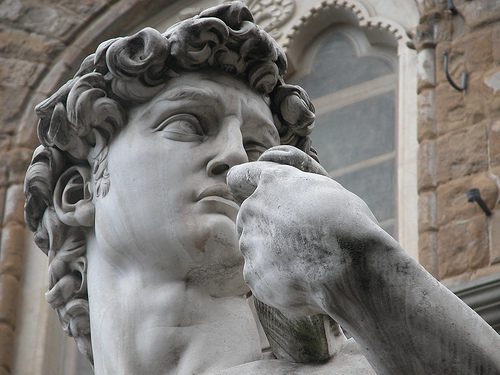
(We are currently in a series on the life of David at Chelsea Village. As I’ve written before I attempt to write a full manuscript of my sermon before preaching. Throughout this series I’ll be posting some of the sermons I think will be helpful. If you would rather listen to the sermon, you can find it here.)
I once read a quote from Charles Spurgeon on the benefits on knowing God and have not been able to shake it ever since. (The quote originally appears in the first volume of The New Park Street Pulpit and you can find it in J.I. Packer’s Knowing God.
“It has been said by some one that “the proper study of mankind is man.” I will not oppose the idea, but I believe it is equally true that the proper study of God’s elect is God; the proper study of a Christian is the Godhead. The highest science, the loftiest speculation, the mightiest philosophy, which can ever engage the attention of a child of God, is the name, the nature, the person, the work, the doings, and the existence of the great God whom he calls his Father. There is something exceedingly improving to the mind in a contemplation of the Divinity. It is a subject so vast, that all our thoughts are lost in its immensity; so deep, that our pride is drowned in its infinity. Other subjects we can compass and grapple with; in them we feel a kind of self-content, and go our way with the thought, “Behold I am wise.” But when we come to this master-science, finding that our plumb-line cannot sound its depth, and that our eagle eye cannot see its height, we turn away with the thought, that vain man would be wise, but he is like a wild ass’s colt; and with the solemn exclamation, “I am but of yesterday, and know nothing.” No subject of contemplation will tend more to humble the mind, than thoughts of God. We shall be obliged to feel
“Great God, how infinite art thou,
What worthless worms are we!”But while the subject humbles the mind it also expands it. He who often thinks of God, will have a larger mind than the man who simply plods around this narrow globe. He may be a naturalist, boasting of his ability to dissect a beetle, anatomize a fly, or arrange insects and animals in classes with well nigh unutterable names; he may be a geologist, able to discourse of the megatherium and the plesiosaurus, and all kinds of extinct animals; he may imagine that his science, whatever it is, ennobles and enlarges his mind. I dare say it does, but after all, the most excellent study for expanding the soul, is the science of Christ, and him crucified, and the knowledge of the Godhead in the glorious Trinity. Nothing will so enlarge the intellect, nothing so magnify the whole soul of man, as a devout, earnest, continued investigation of the great subject of the Deity. And, whilst humbling and expanding, this subject is eminently consolatary. Oh, there is, in contemplating Christ, a balm for every wound; in musing on the Father, there is a quietus for every grief; and in the influence of the Holy Ghost, there is a balsam for every sore. Would you lose your sorrows? Would you drown your cares? Then go, plunge yourself in the Godhead’s deepest sea; be lost in his immensity; and you shall come forth as from a couch of rest, refreshed and invigorated. I know nothing which can so comfort the soul; so calm the swelling billows of grief and sorrow; so speak peace to the winds of trial, as a devout musing upon the subject of the Godhead.”
One thing I wrestle with and have been hearing about for a long time is the need for sermons to be “practical.” We want to be able to take notes and write something down I can put into place tomorrow morning. The problem with this approach is sometimes I simply need to know something and spend days, months, weeks, and years letting it shape how I view reality. This is especially true when we come to what we call “the attributes of God.” We need to know who God is and understand how he works both in our lives and in the world in general. We were made to know God, and you cannot know him without knowing who he is.
So today we want to see who God is as it is revealed in his promises to us. And then when we see who he is we see how we are called to respond to him. We are going to see this today from 2 Samuel 7. This passage is the pinnacle in our study in the life of David. Everything in the entire Bible has led up to this point and you cannot really get the rest of the Bible without getting to this. Someone has estimated that at least forty other biblical passages explicitly reference this passage.
One thing we need to remember as we approach 2 Samuel is the story leading up to this point. The Bible is not a collection of randomly scattered events and thoughts. The Biblical writers record a story, which begins in the garden of Eden and ends in the city of God. You will need to know a couple of major plots lines for this passage of Scripture to land with its full force. The first one can be found in Genesis 11:27-12:3. After the Tower of Babel incident, the writer of Genesis introduces us to an old man named Abram. Abram has no children but God promises to make his descendants as numerous as the stars in the sky. In particular he promises Abram land, offspring, and a blessing. By the end of Genesis Abraham’s grandson Jacob has twelve sons. In Genesis 49 the family which now numbers around 70 people is in Egypt and Jacob blesses his sons before he died. He said about his son Judah, “The scepter shall not depart from Judah, nor the ruler’s staff from between his feet, until tribute comes to him; and to him shall be the obedience of the peoples.” Jacob’s son Judah would never have the scepter out of his hands. Then in the book of Exodus Jacob’s family is over one million people and the Lord leads them out of Egypt through the hand of Moses. Joshua leads the people into the land of promise and conquers the land, but they never live completely at rest from their enemies. David, from the tribe of Judah became king a few chapters ago. And now we hear a word from the Lord concerning David. Through it we get not only a glimpse of David’s future, but a picture of the future of David’s family line and the future of the whole world. Through this all as well, the main character in this entire drama tells us about himself.
“Now when the king lived in his house and the LORD had given him rest from all his surrounding enemies, the king said to Nathan the prophet, “See now, I dwell in a house of cedar, but the ark of God dwells in a tent.” And Nathan said to the king, “Go, do all that is in your heart, for the LORD is with you.”
But that same night the word of the LORD came to Nathan, “Go and tell my servant David, ‘Thus says the LORD: Would you build me a house to dwell in? I have not lived in a house since the day I brought up the people of Israel from Egypt to this day, but I have been moving about in a tent for my dwelling. In all places where I have moved with all the people of Israel, did I speak a word with any of the judges of Israel, whom I commanded to shepherd my people Israel, saying, “Why have you not built me a house of cedar?”’ Now, therefore, thus you shall say to my servant David, ‘Thus says the LORD of hosts, I took you from the pasture, from following the sheep, that you should be prince over my people Israel. And I have been with you wherever you went and have cut off all your enemies from before you. And I will make for you a great name, like the name of the great ones of the earth. And I will appoint a place for my people Israel and will plant them, so that they may dwell in their own place and be disturbed no more. And violent men shall afflict them no more, as formerly, from the time that I appointed judges over my people Israel. And I will give you rest from all your enemies. Moreover, the LORD declares to you that the LORD will make you a house. When your days are fulfilled and you lie down with your fathers, I will raise up your offspring after you, who shall come from your body, and I will establish his kingdom. He shall build a house for my name, and I will establish the throne of his kingdom forever. I will be to him a father, and he shall be to me a son. When he commits iniquity, I will discipline him with the rod of men, with the stripes of the sons of men, but my steadfast love will not depart from him, as I took it from Saul, whom I put away from before you. And your house and your kingdom shall be made sure forever before me. Your throne shall be established forever.’” In accordance with all these words, and in accordance with all this vision, Nathan spoke to David.”
2 Samuel 7:1-17
We reach David at an important time not just in his own life, but in the life of Israel. God gave David rest from his surrounding enemies. If you read Joshua, Judges, and 1 Samuel you know Israel did not experience rest from their enemies. Something different has happened to them now that David is king. Things have calmed down enough that David is able to build his palace. They constructed the palace with cedar which is expensive and sturdy. David looks around and see that he is living in a house of cedar but the ark of the covenant is sitting in a tent. This troubles him so he determines to build a house for the ark of the Lord and Nathan the prophet tells him to do whatever is in his heart.
Nathan heard the word of the Lord that night and it contained a message for David. The Lord’s presence as symbolized in the ark has not dwelt in a house the entire time they were wandering in the wilderness or coming into the land. His presence was with his people and moved wherever they did. He never asked for them to build a house for the ark, and never questioned why they did not do it.
David wanted to build a house for the Lord, but God told him he would not do it. Instead God rehearsed what he had done for David already. He took him out of the pasture and made him the king over the people. He went with David wherever he would go and cut off his enemies. Now the Lord said he would make a great name for David and he would make a house for David. The turn of events here is astonishing. David wanted to build a house for the Lord, but the Lord says he will build a house for David.
He does not speak here of a house made of stone or wood, but of a dynasty. The people would be planted and disturbed no more. They would live in a place with peace. The Lord swore David’s house would continue after his death. The day would come where David would like down with his fathers, but his offspring after him would have his kingdom established by the Lord. Now this one would build a house for the Lord, and the Lord would establish his throne forever.
Did you notice how often the Lord says “I will” in this passage? There is something we see here we cannot ignore. Christianity does not begin with what we do for God. Whether driven by guilt or duty, we believe there are things we should do for God and this will settle things between us and him. Christianity does not start with your good works for God though. The starting point for Christianity is what God has done for us. Because of our sin, we could not do what we should do for God anyway. Even if we could do all we should do for God, we would not want to, so Christ came and did what we could not do. He obeyed God perfectly from beginning to end. Then he died in our place for our sins. And he has risen from the dead conquering our greatest enemy and now we know that every person who entrusts themselves to God stands before him cleansed, forgiven, justified, restored, redeemed, and adopted. If you have been considering Christianity I hope this reality will land upon you today. Your only hope is Jesus who lived, died, and now lives for you.
Then after trusting in Christ we rise empowered to follow him. We do this through a continual pattern of repentance, faith, and obedience. We repent of sin, believe the truth of the Gospel, and leave empowered to obey. What we see rising over the years is both our level of obedience and desire to obey. We have to get the order right though. We do not obey to get God to accept us. God accepts us because of our faith in him and then we obey because we have already been accepted.
This is what we often call the Davidic Covenant. Some of the things you would expect from a covenant are missing here, at the same time you have the promise of what God is going to do and it sounds similar to other explicit biblical covenants. It’s important to remember that a covenant is a promise. Usually they are two-sided with each party making promises and stipulations for keeping the covenant. God does not tell David one single thing to do here. He simply states what is going to happen.
There are a couple of things he promises here. The first is that offspring will come from David’s body and he sill establish his kingdom forever. Now you cannot help but read some of what the Lord says here to David and not think about what he to Abram in Genesis 12. “Now the LORD said to Abram, “Go from your country and your kindred and your father’s house to the land that I will show you. And I will make of you a great nation, and I will bless you and make your name great, so that you will be a blessing. I will bless those who bless you, and him who dishonors you I will curse, and in you all the families of the earth shall be blessed.” God promised to make Abram into a great nation in whom the nations of the earth will be blessed. Then remember Jacob blessed Judah and said the scepter would not depart from his family. Now here is David, from the tribe of Judah, and the Lord promises to make his name great and to make him an everlasting kingdom. The promises God made hundreds of years before get more clarity as we see how they will be fulfilled specifically in the line of David.
The line which gets the most attention in this passage is “I will be to him a father and he shall be to me a son.” This passage does something interesting because the next thing you see is a reference to what will happen when the son gets out of line. You know the most explicit reference is likely to David’s son Solomon. He will build the temple in the book of 1 Kings, and we will definitely see him sin and experience the discipline of the Lord. At the same time the New Testament writers apply this first to Christ and then to the entirety of the New Testament Church.
First we need to see this as a reference to the work of Christ. The writer of the letter to the Hebrews quotes this verse to show Jesus is superior to the angels. People in this first generation after Jesus ascended into heaven were tempted to abandon Jesus for angel worship and the writer wants to show that promises were made to Jesus that were never made to the angels. (In fact offers have been made to you that have not been made to the angels. The angels have never known the privilege of being redeemed. Our redemption is something into which angels long to look, so never denigrate your redemption by saying a person became an angel when they died. Heaven does not gain an angel when someone dies. It gains a redeemed human being purchased by the blood of Christ.) While God’s words to Nathan first apply to Solomon they ultimately apply to Jesus who is the Son of God and whose Kingdom will never perish. The father will establish the throne of the Son forever and we even see this in Hebrews 1 when Jesus sat down after making purification for our sins.
We need to see here that Jesus is the King. All of human history points to the reign of this great King. This is why Jesus could even say the Kingdom of God was at hand in his ministry. Because of his death and resurrection, we currently live under his reign. He rules and reigns in the hearts of his people. We belong to King Jesus and live our lives under his authority and dominion. He is the kind of King you want to live for though. I probably reference this every few months but I love in The Lion, The Witch, and the Wardrobe when the children are asking Mr. Beaver about Aslan. They ask him if Aslan is safe. He responds, “Safe? Who said anything about safe? Course he isn’t safe. But he’s good.” This is what we could say about Jesus as well. He is the ruling and reigning King. He is the one who will one day judge the earth. He will tread out the winepress of his wrath. He sustains the world by the word of his power. And yet he is good. This is why we can and should trust him. He is the powerful king and he is good.
Think about how suspect we are about people who stay in power too long. If there was one thing I could change about our system of government I would impose term limits on Congress. When they stay in the Washington bubble too many years they forget what it is like to live as an ordinary citizen and it feels like they only care about us when election time comes around. Jesus is exactly the opposite though. He has reigned for thousands of years and yet he still sympathizes with us. He has all of the power in the world, and yet he is thoroughly and completely good. He knows us and he sympathizes with us in our weakness. “You can trust a sovereign God who bleeds for you.”
Paul applies this phrase to the church in 2 Corinthians 6:18. David’s dynasty encompasses a world wide family that lives under the rule and reign of Jesus. Paul quotes this to remind us that we are to come out from the world around us and be separate. Because we are the people of God who live our lives under the reign of God’s forever king, we do not live like the rest of the world. In particular we value things in a different way from the way the world does. Most particularly Christians will have a different view of money, sex, and power than the the rest of our culture. We will view money as a tool and not as a god. We will use sex in the way God intended it and we view power as a means to serve and not as a means to be served.
At the heart of this passage though is a promise. God says his reign will be instituted through the family of David and this will be realized through Jesus. He will come from the tribe of Judah and from the lineage of David. He will be a king, but will come to kingship differently than David did. David took lives to become the king. Jesus became king by laying down his life and taking it up again. We find life as it is really meant to be lived through faith alone in this great king.
Related Posts:
“David and Saul“
“David Becomes King“
For Further Reading:
Knowing God by J.I. Packer
Knowledge of the Holy by A.W. Tozer












